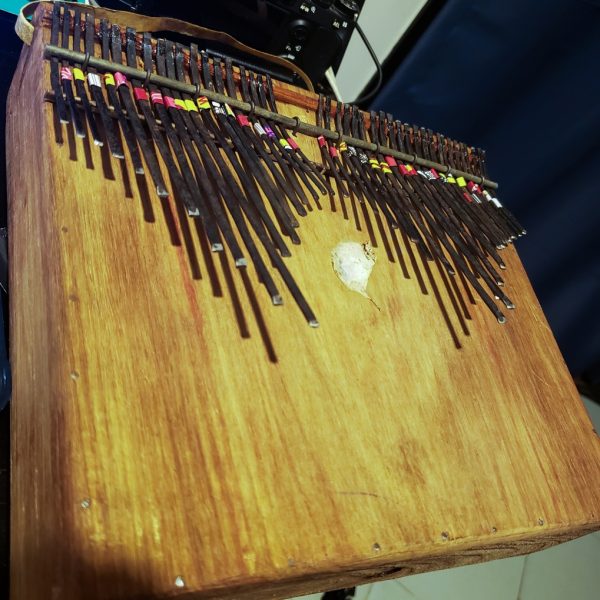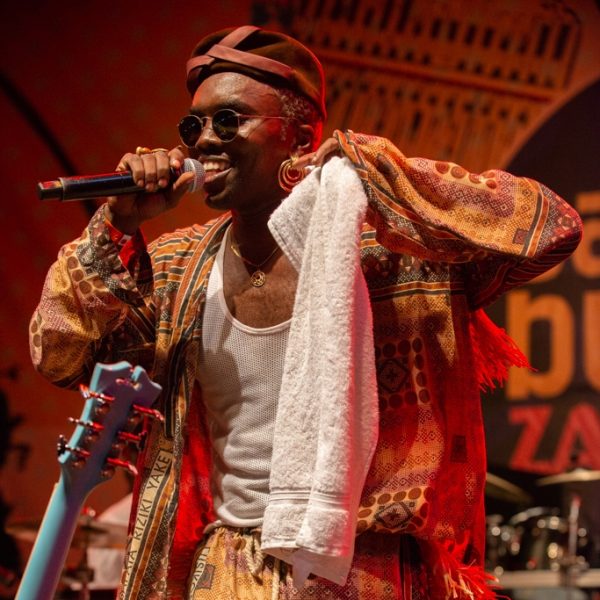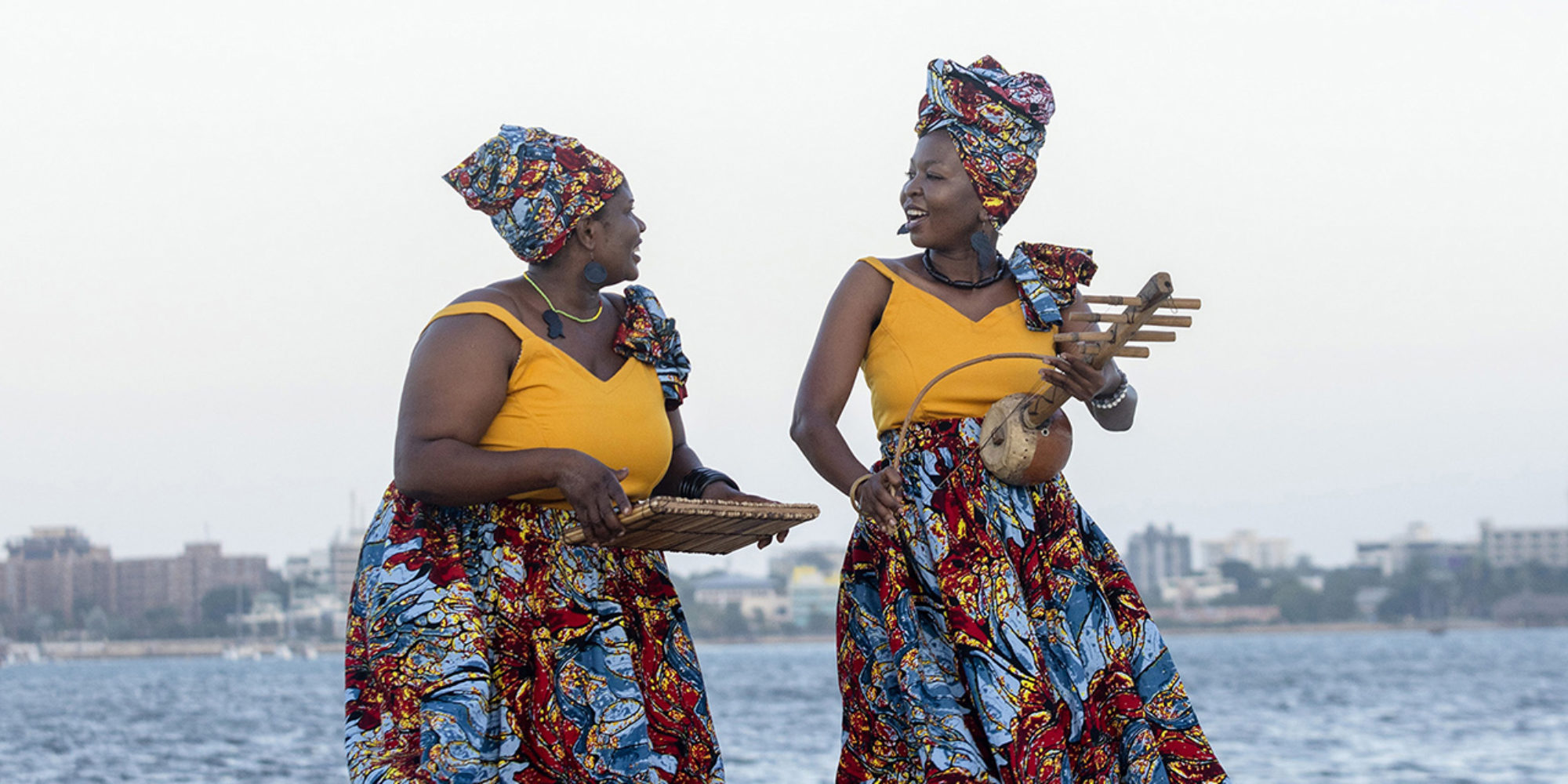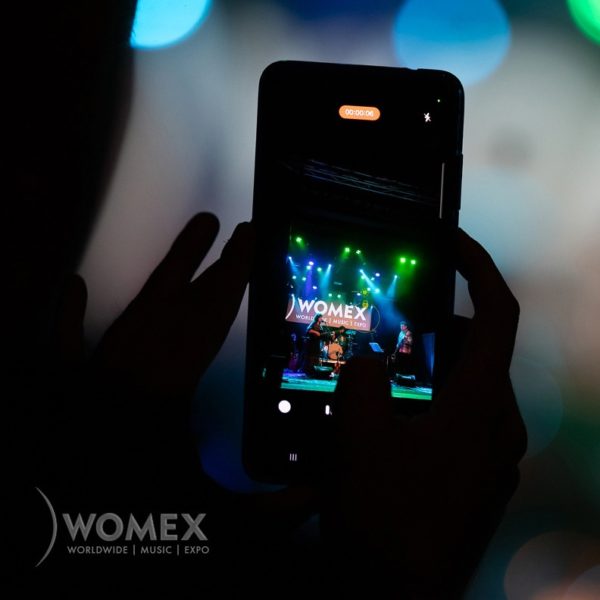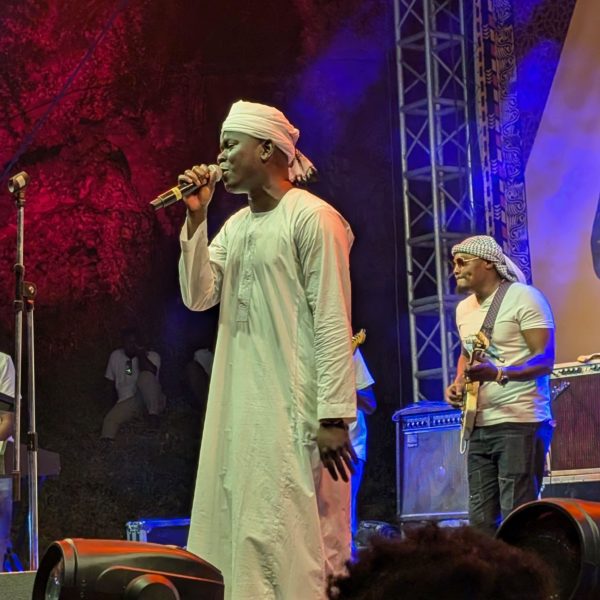Our pride is our music, yes.
We love and we dance to our African music.
We love and we celebrate our Tanzanian music.
I am proud of my heritage.
I am proud of my clothing.
I am proud of my environment.
I am proud of our traditions, oh yes.
I was born into a family of music, oh yes.
I found my grandfather and father playing traditional music, oh yes.
Grandfather is the roots, Father is the trunk, and I am the branches of music, oh yes.
Grandfather is the roots, Father is the trunk, and I am the branches, oh yes.
- “Fahari yetu” by The Zawose Queens
Thumnail image by Michael Mwambo
One of the most exciting African acts to arrive on the scene this year has been Tanzania's The Zawose Queens. With their critically-acclaimed album, Maisha, and performances at Sauti Za Busara, WOMAD and Glastonbury, we were very anxious to see them for ourselves. And we thoroughly enjoyed their WOMEX showcase this year and had a chance to interview them later, via Zoom, along with their manager, Aziza, who also acted as translator for the Queens.
But their story actually begins a generation back, or two. Starting in the 1980's, Peter Gabriel's Real World Records, began releasing albums from two Tanzanian artists, “Doctor” Remmy Ongala (originally from the DRC) and Hukwe Zawose (of the Gogo ethnic group). Both men became famous, at home and internationally, and were popular performers on WOMAD stages for many years. Then, Hukwe passed away in 2003, Remmy in 2010. Besides leaving their catalog of music, they also gave birth to many children. Some of Hukwe's children and grandchildren continue to perform as The Zawose Family Band. While Remmy's daughter, Aziza, found herself working in events management, then running a festival, and eventually taking a job as arts manager for the British Council in Dar es Salaam in 2019.
“We were working with other arts managers around East Africa” Aziza Ongala said. “And I've always tried to figure out 'what is the Tanzanian sound?' You know, when you hear West African music, you hear the kora, and you know this is West African. And I always wondered what if we had a sound in Tanzania, what would it be. So I told the regional manager I'd like to discover that. I wanted to work with some traditional artists, hook them up with some UK producers, as that was part of the mandate, and see what we can do.”
She set forth to gather some musicians from around the country, give workshops on artist development and confidence building, and then have a second workshop focusing on musical collaboration in conjunction with two British producers, Tom Excell and Oli Barton-Wood. For the first part, they had a larger group of musicians. “And funny enough,” adds Aziza, “the person teaching the confidence workshop, a Kenyan artist, would later to become my husband, Mandela.”
For the second part, they focused on two groups of artists. Aziza found a quartet of young guys from the Safwa tribe in northern Tanzania named Wamwiduka who play home-made instruments.
From the beginning of the project, Aziza knew she wanted to bring in women and specifically women from the Zawose family. She knew the Zawoses through her father, and in particular was looking for Pendo Zawose, who had toured with her father, but she didn't know her name. A few years earlier, Aziza had booked the Zawose Family Band for a local show in Dar.
“They came and did a traditional act” Aziza recalled. “And I was sitting there watching them and always thought the women are so powerful, but they're always behind the men. And I'm like, wouldn't it be amazing to get some of their vocals out there and to give them center stage. There's a kind of chanting they do when they're calling the spirits or acknowledging the ancestors that is so beautiful.”
Eventually, she connected with one of Hukwe's granddaughters, Leah. She had asked Leah to bring another woman from the family to the workshop, and just by chance or fate – for she was not the aunt she had originally planned on bringing – it was Pendo who came with her. “Leah knew her aunt Pendo, but again I didn’t know her name,” Aziza explained. “Pendo was one of the women mentoring the younger group, but she was closer to other family members. But then Pendo ended up coming because the others were busy.”
We have to pause here to talk about how in the Zawose family, because, as Leah explained, “In the family group, the women could only do dancing, singing and play the mheme drums,” which is the drum that's held between the thighs. They weren't allowed to play other instruments, because the tradition is that when a woman is on her menstrual cycle, they believe she throws off the tuning of these instruments. So a lot of the women would steal those instruments to secretly learn to play them, like the ilimba, the marimba and chieze. So while Leah and Pendo had secretly learned to play some other traditional instruments, to play them publicly would be breaking the family tradition and pretty much be an act of defiance, although Leah had already begun playing outside the family.
“In 2009,” Leah recalled, “I started venturing out and started performing with a theater group. I'm also part of a female band, and do backup vocals for another alternative artist, but I always stayed and performed in the family group. And yet, I was always dreaming to be more of a solo artist. That's why I consciously decided to play and perform with all these other entities, because I needed the experience and the confidence. And I gained something from going out and performing with people other than the family, because it was a different culture altogether from what I was used to.”
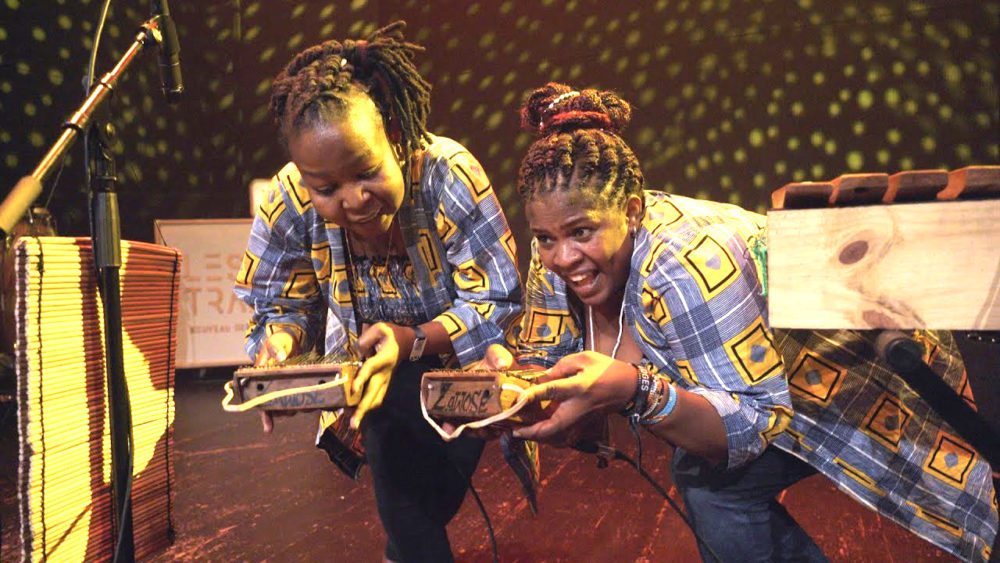
Pendo was closely mentored from about the age of 10 by her father, Hukwe. But of all her sisters, he seemed to take a special interest in her. She was actually the first female of the siblings he would tour with.
“My father was very particular in terms if I made a mistake,” Pendo recalled, “whether it came to the dancing or playing the instrument, he would always make a huge effort to correct me. Yes, my other sisters were also in rehearsals, but I feel he definitely singled me out for some reason. I think maybe he saw something in me, but I really don't have an answer. He was the kind of man when he said he was going to do something, nobody would question him. So no one would dare question why I was chosen to go on tour with him or anything like that. It was very hard for me when he passed away, but I'm grateful for the fact that he did mentor me. After he passed, I wanted then to stand up in my own right, and always had faith that one day I would have an opportunity to prove myself.”
At the second part of the project, Aziza, Mandela, the two UK Producers (Tom and Oli), along with Wamwiduka, and the Zawoses gathered in Stone Town, Zanzibar where they focused on songwriting and musical composition.
“It turned out to be a very interested fusion,” Aziza, said, “and the residency itself was more about the exchange, the collaboration, and also the experience of them all working together. But at the time, I wasn’t thinking it would go beyond this. The main thing was just coming together and jamming and creating something new. So the idea was working for me, to see if we can have some kind of fusion between them and electronic/western music. We didn't really know what would happen afterwards.”
The first song Leah and Pendo wrote was “Sauti Ya Mama,” which means “the mother's voice,” and talks about the importance of how a mother's voice is the sweetest. Whether she's angry or upset, it's still the voice of your mom, that no one on the planet would have more patience for you, and whether you're wrong or right your mother would still love and support you.
The second song was “Fahari Yetu,” means like “our pride.” It talks about their pride as Tanzanians, their pride of their traditions, and how they're proud of all that. Both are on the Maisha album.
The third song that came out of the workshop was “Safari ya Mziki” which means “the musical journey,” specifically how hard it is for women in the music business. Tom used the track on an album with his own band Onipa, which was released a year before Maisha.
“I think those first three songs actually summarized the whole experience of their space as women,” Aziza realized. “Looking back now, I definitely see how they encompassed all of that. But I don't think the girls were impressed at first. I think it took them time to get used to hearing their own sound with the electronics together.”
Pendo responded, “When we heard the music for the first time, we understood it was different, and had to be different to appeal to a different audience. We were also very aware that if we wanted our music to be accessible, it had to almost be recreated. And also while it was different from anything we expected, I had already performed with my brother, Msafiri [Zawose], who was doing this kind of stuff with electronics, so it wasn't totally new to me. I came to understand that this is a new wave of how our music was meant to be consumed.”
Aziza recalled, “And then at the end, I think we were all like, 'Oh, this music is too good. What are we going to do with it?' We were all very inspired. And then everybody was like, 'Yeah, these girls, these queens, need to do this.' And that's how their name came about.”
At this point, while everyone was excited with what they recorded, the workshop was over. But then Tom and Oli said they wanted to return and really make this into something. So they went back to the UK and set about raising funds. Originally they'd hoped to make two albums, one for the now dubbed Zawose Queens and another for Wamwiduka, but in the end the Queens were of most interest to the labels, though Wamwiduka do play on one of the album's tracks.
They were now all working together on this goal of making a Zawose Queens album. Leah got her father, Ndahani Bwani Zawose, a tzetze player, involved. They wanted him to come and give generational support for the recording and he wound up playing on several tracks. In fact, both her mom and dad and also Pendo's mom helped them compose the additional songs for the album. Leah said, “My parents were just so happy to support me and felt it would be something positive for them to be involved in.”
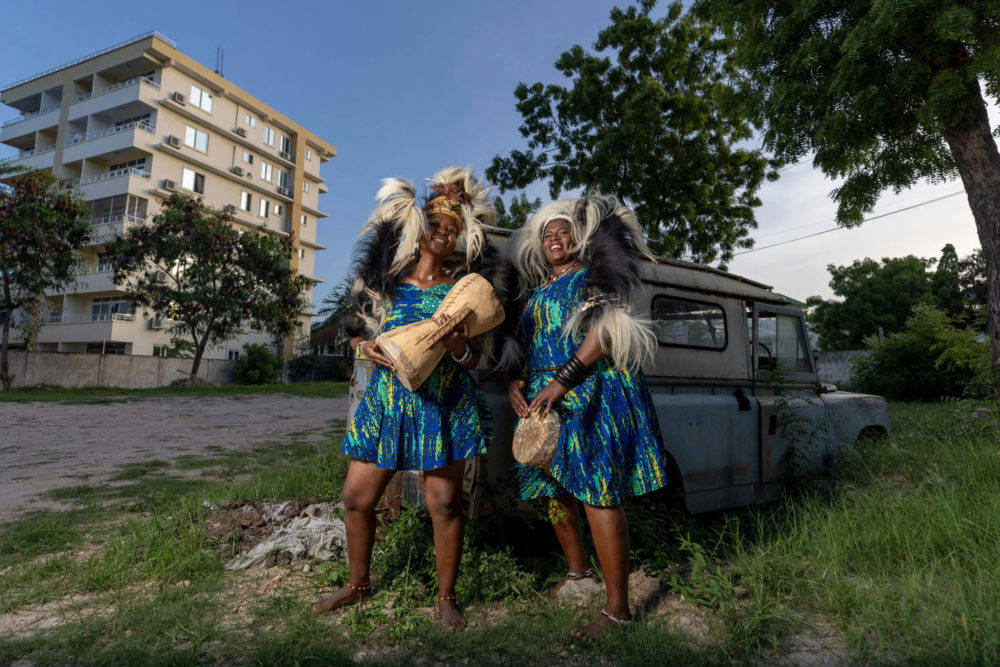
So the record was recorded in 2019, but then COVID hit. “And we all forgot about it,” Aziza said, who is now also their manager. “The world was on lock down and we just moved on with our lives. And it was only then in 2023 that WOMAD got back to us and said, 'Hey, guys, we want to push this album for next year.' And then Tom connected us to an agent who started booking shows. In the beginning, I wasn't thinking the outcome would be a band at all, I just wanted to sort of see if I could recreate a Tanzanian sound, but here we were.”
When we asked the Queens how they feel about the sudden success, they said they were overwhelmed with the fact they were going to perform at WOMAD because it had been a platform for Hukwe, and Leah's dad had also performed there many times. As well, to be on Real World Records also connected them back to the family legacy. And so for them, they were super excited to fulfill that part of their legacy, but most importantly, as their own solo female act.
“It was a huge deal for them,” Aziza said, “but they had to like keep it under wraps because not everybody was going to be happy about it. It's like they have to keep their pride under wraps, because they're very humble, simple people. But also because there's the conservative, patriarchal angle and because they are women, it could be seen in a bad way, yet they are very proud. And while they have the guidance and support from the older generation, I feel they're still seeking validation from the younger generation.
“For me, I'm more interested in just helping to create music that kind of lasts forever, that has something to say, and has a lasting legacy. That's kind of what I'm looking at. I think we all have a story. We all have a legacy.”
The Zawose Queens are currently working on their second album which is projected to be released towards the end of 2026. At that time, they will also start a world tour.
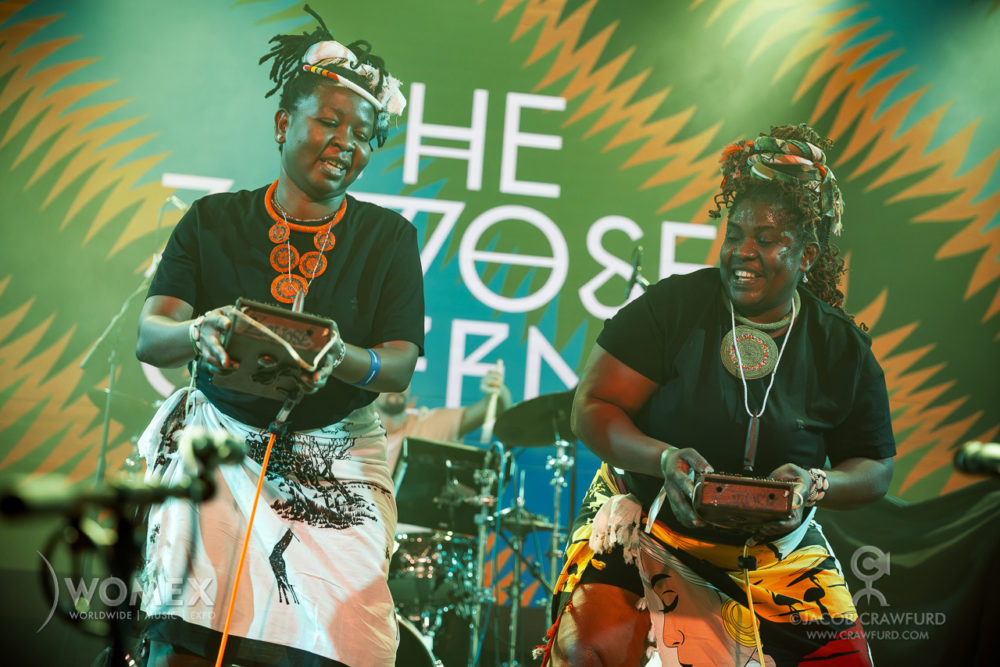
Related Audio Programs
